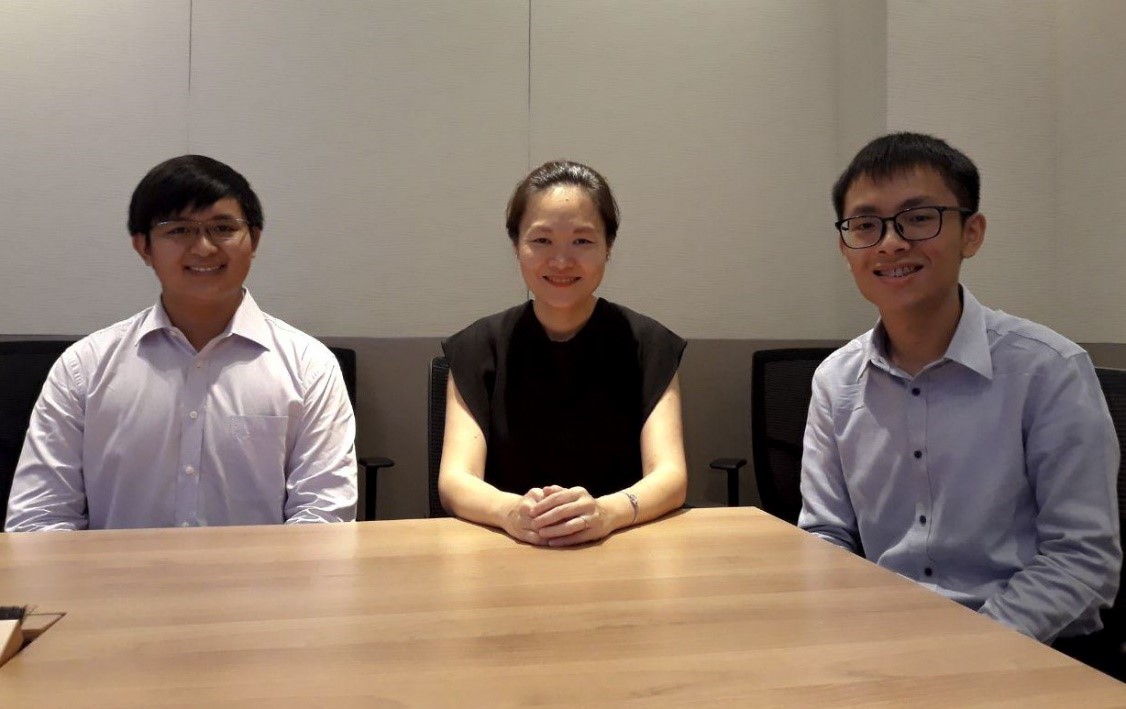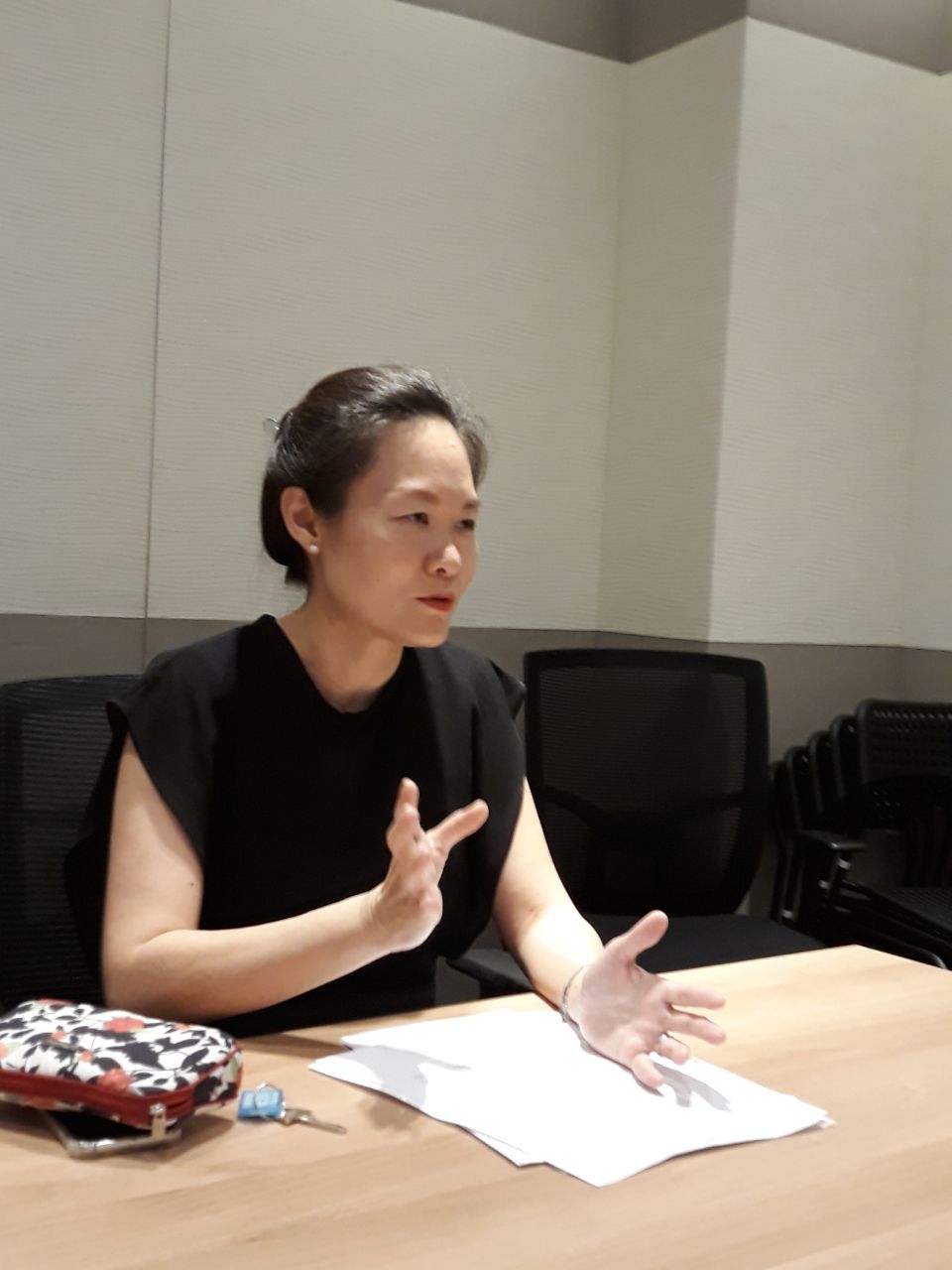Patients, at the heart of all we do
By Adison Goh (Class of ’20) and Benedict Lee (Class of ’20)

Student writers Benedict (left) and Adison (right) with Ms Irene Quay
In this issue, we spoke to Nominated Member of Parliament & President of the Pharmaceutical Society of Singapore, Ms Irene Quay, about her goals for the Pharmacy profession and healthcare in Singapore.
Ms Irene Quay graduated from NUS Pharmacy in 1997. After completing her pre-registration training at the Singapore General Hospital, she worked as an oncology pharmacist and held various roles at the KK Women’s and Children’s Hospital (KKH) and National University Hospital. Irene is currently a Nominated Member of Parliament (NMP), President of the Pharmaceutical Society of Singapore (PSS), as well as the Head of Pharmacy and Assistant Director of Allied Health Office at KKH. She also sits on multiple committees across SingHealth and the Ministry of Health, such as the Closed Loop Medication Management (CLMM) Core Clinical Decision Taskforce (CCDT) and the Pharmacy Specialists Accreditation Board (PSAB).
You were appointed as an NMP in September 2018. How has your experience in Parliament impacted you thus far?
My experience in Parliament has opened many new learning opportunities for me. I have been working in healthcare for the past 20 years, and involvement in parliamentary discussions have exposed me to a variety of topics and issues, such as law, manpower, finance, economics, the arts, as well as a myriad issues concerning Singaporeans. This allowed me to appreciate the challenges faced by our government in ensuring a good balance in all aspects while managing conflicting challenges and needs.
Tell us about some of the efforts you are championing as an NMP and President of PSS.
We are working on how everyone, from various institutions and sectors, can come together to improve the efficiency of our healthcare system, as well as improve patient care. I believe that there is synergy when there is collaboration between pharmacists from different sectors such as hospital, community, industry, etc. For example, we are having pharmacists from the hospital and the community come together to develop a medication therapy management program. Also, we are looking at developing a common, national Patient Information Leaflet (PIL) for every drug, that patients can access through applications like HealthHub. This requires input from pharmacists from different institutions, and through this initiative we hope to empower patients and improve quality of care. Apart from that, we are also getting industry and community pharmacists to support schemes for improving medication adherence, such as developing kits that will help the elderly with compliance.
Another area we are working on is the issue of medication waste. There are two parts to this. The first is the issue of overprescribing, where more medications may be dispensed than necessary, leading to wastage. The second part is the safe disposal of medications. We are looking to collaborate with MOH and NEA to address this. Currently, we are planning a nationwide campaign to raise public awareness about safe medication disposal. We also hope to have pharmacist volunteers, from all sectors, involved in sorting out medications that require special disposal from those that are safe for normal disposal.
Another issue would be antimicrobial resistance which is very important, and a lot more can still be done. I believe that these are causes which every pharmacist can be actively involved in.
As an individual, how do you stretch yourself across so many different efforts?
You must actively engage and motivate others with the same dream. In doing so, you get others energized and inspired. When others understand the value of the cause, and find it meaningful, they will be motivated and want to come together to do things. Moreover, as I am engaged in multiple roles, it is necessary to empower and trust my colleagues to run the show, while maintaining oversight and be there to support them should any problems arise.
Apart from that, it is important to be disciplined and have good time management. It is also necessary to be clear about your vision and purpose in life. When you are passionate about something and work towards it, you gain energy and immense fulfilment from the things that you do.

At the end of the day, it’s about serving others. If you start thinking about yourself, you can’t. Sometimes you have to see things from the angle where it’s not just about yourself, but more of what’s best for the patient; it’s about what you can do to benefit a bigger group of patients.
– Ms Irene Quay
What were your aspirations when you were a Pharmacy undergraduate? Did you see yourself stepping up into the roles you hold today?
My passion is to serve the public in healthcare. I have always wanted to work in a hospital environment as I strongly believe that clinical pharmacists can play a crucial role in the healthcare team and in medication management to optimise patient treatment outcomes.
I certainly did not see myself taking up these roles today. I think that if you are passionate about what you do, and you are responsible and do things well, slowly, over time others will know what you can do, and opportunities will start coming your way. When the opportunity arises, I believe that we should come forward to serve wherever possible.
Where do you draw your motivation & inspiration from?
As a young pharmacist, I think role modelling is very important. [A/Prof] Lita [Chew] and [Dr] Camilla [Wong] are my role models. I saw them working to advance the pharmacy profession and improve clinical practice, and it was very important in getting me started and interested.
Once you have that role model, you start to get engaged. After a few years, when you are more experienced, you start to have your own dream and a clearer image of what you want to do for patients and the profession.
In my personal life, I strive to be a role model for my children as well. For example, when I’m doing volunteer work at the hospice, I would bring them along because I want to teach them the value of volunteerism. When you tell them it’s important to serve people, they must see that you are serving.
Furthermore, as my passion is in healthcare, I am always thinking about what I can do to benefit a larger group of patients. For me, it’s about developing the profession with the final goal of better patient care.
What advice would you give to current undergraduates and alumni?
To engage in lifelong learning, so that you are always ready when the opportunity arises.
Sometimes, you may face setbacks or disappointments. When you are down, always go back and think about your purpose in life. What do you really want to do? Where does your passion lie? That will give you the drive to keep going.
Don’t ask what others can do for you, but rather be there for the community or profession when they need you, for it is an honour to be able to serve in whichever functions you are asked to.
